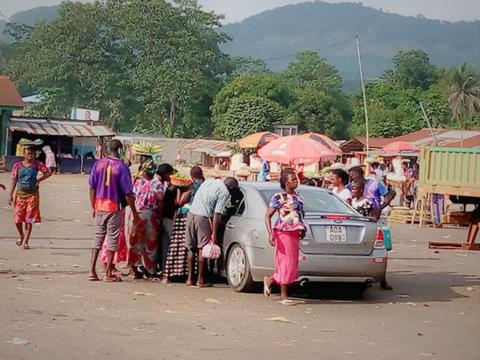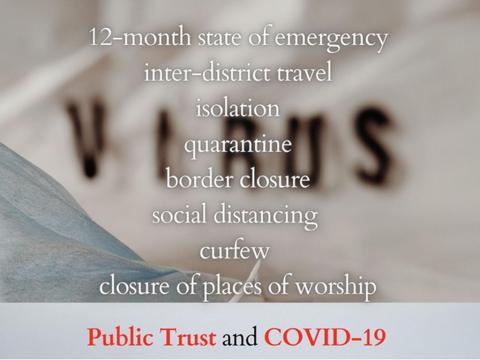By Kemo Cham
Allieu Alghali and his family were locked up and quarantined two months ago, when a neighbor living in their compound, at Kissi in the Sierra Leonean capital, Freetown, tested positive for COVID-19.
But what happened during quarantine, and the alleged misconduct by professional staff, left him bitter and in need to seek justice. Alghali now plans to sue the National COVID-19 Emergency Response Center (NaCovERC), the agency in charge of the country’s response to the coronavirus pandemic.
“I was ready to die”
Alghali and his family were quarantined for over 40 days, during which he felt dehumanized, humiliated, and starved, he said. They received food several days later and it was not enough to feed everyone, while the COVID-19 tests were delayed unnecessarily, causing anguish, suffering and mental trauma.
The entire process caused him to lose trust in the government’s ability to manage a health crisis. He has lost trust so completely that, when his daughter’s COVID-19 test came back positive, he refused to allow the medical staff access to treat her.
“I was ready to die to prevent them from touching my daughter,” he said in a telephone interview with Politico.
But worst of all, he said, were the multiple cycles of quarantine they had to endure because the professional staff failed to implement basic safety measures, such as social distancing, at his compound at Blackhall Road. This meant that every time a quarantined person’s test result returned positive, the entire compound had to restart the 14-day cycle. According to the World Health Organization (WHO), quarantine should not be more than 14 days, and in some cases, it can be as little as 10 days according to the U.S. Centers for Disease Control.
On March 24 Sierra Leone’s President, Julius Maada Bio declared a 12-month long state of public health emergency, allowing government officials to enforce quarantine measures, among others. Due to missteps, some were quarantined for up to 42 days, a reality which NaCovERC did not deny.
Lack of public trust derails government efforts
According to a South African scientific study published in June, to enforce quarantine, governments “must ensure sufficient access to resources to meet the basic needs of people whose movement and freedom will be restricted. During quarantine at home, people will need food, medicine and communication to enable health monitoring, including transportation of ill people to hospital. If the government cannot provide such basic needs, the forceful removal of any individual into quarantine will be unjustifiable and unethical.”
Before the coronavirus outbreak in Sierra Leone, people already felt overwhelmingly dissatisfied with their personal living conditions and the country’s economy. According to the newest poll by Afrobarometer, a self-described pan-African, nonpartisan survey research network, 84% of Sierra Leoneans felt that the economic conditions in their country were “fairly bad” or “very bad.”
The survey pointed out that “dissatisfaction with the country’s economy and personal living conditions is reflective of citizens’ increasing levels of deprivation in their everyday lives, as large majorities experience shortages of food, clean water, and other necessities.”
The survey was conducted in March on 1,200 adult Sierra Leoneans with a margin of error of +/-3%.
The Human Rights Commission of Sierra Leone (HRCSL) Chairperson Patricia Nasu Ndanema said that HRCSL monitored the COVID-19 response and raised several issues in their first report dated March 17. However, some of those problems remain unaddressed by the government, she said. Ndanema expressed concern that continuing to perpetuate those violations will steadily erode public trust and eventually derail the government’s efforts in containing the pandemic.
“Overstaying [in quarantine] is still a problem and that is our concern,” she said.
Ms. Ndanema said she witnessed a case in which people walked out of quarantine in search of food, water, or medicine, or to work to make money, and returned home at night.
Waking up in a lockdown
Alghali’s nightmare ended as abruptly as it started. One day, without any warning, the security officers who enforced the quarantine packed up and left. His story may be emblematic of the alleged abuses, as more people feel compelled to talk about their experiences in quarantine.
Amidu Mattia, Chairman for Persons with Disability from Mattru Jong, Bonthe District, was brutally awakened from his sleep on the morning of June 2. Before he could ask any questions, he observed how armed soldiers surrounded and barricaded his compound. To him, it felt like a death sentence.
Studies point that the poor, the elderly, the disabled, the incarcerated and the homeless suffer the most during quarantine.
Mattia explained that his neighborhood was quarantined temporarily as local officials scrambled to find a COVID-19 escapee from Guinea who may have crossed the border into Sierra Leone. While in quarantine with no warning, people panicked and looked for ways to get out and find food, water and medicine.
“People escaped to search for food. If they later tested positive for COVID-19, that meant that they infected many others outside,” Mattia said. “We are not animals. We are people. NaCovERC there in Freetown has to support DiCovERC to be able to take care of us like human beings, not treat us like animals.” Mattia also complained that food was delivered late, it was insufficient, and he had no access to medicine, or medical staff.
Mattia’s neighbor, Aminata Bah, was quarantined for 17 days with her seven-month-old baby. As a petty trader she worked hard to make extra income and provide nutritious food for her baby. But in quarantine she lost this ability, and no one asked her about her special needs. She was upset about the lack of compassion and understanding from quarantine staff.
“We all want to help stop the spread of the coronavirus. But this system is not working. We can’t be locked up without food and water and asked to sacrifice to stop the virus. If I don’t sell, I don’t survive. I am reduced to having to beg to feed my baby,” Aminata said.
Joe Momoh, also from Bonthe, said that on May 31st soldiers, police officers, and health officials quarantined him because he may have been in contact with someone who tested positive for COVID-19. “No one asked if we were well, if we were sick, we could have just died and others could have contracted the virus because no one cared about us,” added Momoh, who spent 20 days in quarantine.
COVID-19 suspect taken to jail
Stories of people jumping quarantine and isolation centers abounded. As recently as mid-August NaCovERC announced they were pursuing a man who escaped and was nowhere to be found. One such escape may have had a role in one of the deadliest prison riots in recent years.
In late April an individual who escaped quarantine was apprehended and taken to jail. Correctional authorities were later informed that his COVID-19 test came back positive. On April 29, a prison riot broke out, which led to 31 fatalities, including one prison staff. Officials stated that among the reasons for the riot was the fact that the inmates found out that COVID-19 was diagnosed within the prison and they feared getting infected and dying.
NaCovERC says they fixed the problems
Retired Lt. Colonel Amadu Abubakarr Koroma oversees quarantine efforts at NaCovERC. He acknowledged that in the early stages of quarantine implementation there may have been missteps, as well as lack of resources, but emphasized that those quarantined may have also acted irresponsibly and are not guilt-free.
“In the beginning it was chaotic,” he described, citing limited manpower to adequately respond to the people’s urgent needs.
Koroma said that as of July all complaints of lack of food or delayed supplies were addressed. In response to concerns over prolonged stay in quarantine, Koroma said it has to do with surveillance, which fell outside of his purview.
Politicization
Abdul Fatoma, Chief Executive of the Campaign for Human Rights and Development International (CHRDI), says that mistrust in Sierra Leone’s response to the COVID-19 pandemic began to shape when President Julius Maada Bio declared the 12-month state of emergency.
“It was like the government already knew when COVID was going to end,” Fatoma said.
Besides concerns regarding the political implication, the declaration may have also contributed to a wave of abuse by security agents enforcing COVID-19 measures and quarantine, the activist said. He stressed that there is an urgent need to legislate these emergency regulations, to bring clarity, and to properly inform the people about their rights and responsibilities.
CHRDI is one of the leading civil society organizations and NGOs that have been monitoring the government’s response to the pandemic.
Fatoma believes the situation became a human rights crisis as people were unable to work and travel due to inter-district restrictions, lack of freedom of assembly, and reports of abuse and mistreatment in quarantine and isolation centers.
According to a United Nations analysis on the COVID-19 measures in Africa, “emergency laws limit rights and disrupt services, supply chains and livelihoods.” While the analysis, published in June, acknowledged that the measures are important in safeguarding public health and wellness, it also stated that emergency powers could be used to introduce measures that may negatively affect fundamental rights such as freedom of speech, freedom of movement or assembly, freedom of the media or freedom to work, among others.
Lack of clarity in measures
The unevenness in which the special coronavirus measures in Sierra Leone were applied have also contributed to erode trust and weaken the belief that the virus is real. For example, Fatoma said, funerals for high level individuals were allowed to proceed with large gatherings of people, while the regular individuals were denied having a proper funeral. This made people feel that those with money and power were exempt from the rules, while the poor were forced to comply and the virus is just a hoax to control them.
The double standard applied in the justice sector also, Fatoma said. While regular court hearings were delayed, a few cases that are considered political in nature, such as the treason trial of former Defense Minister, Alfred Palo Conteh, were allowed to continue.
Need to remove politics from emergency response
Fatoma says the government needs to rethink its social mobilization strategy and, crucially, remove politics from it to start rebuilding public trust. Sensitization is also key, he stressed. “We believe that the effectiveness of measures to defeat COVID-19 depends on the government’s ability to secure people’s participation and trust,” he emphasized.
A study focused on Public Trust, Capacity and COVID-19 published by the Policy Center for the New South, found that states that enjoy higher trust and are engaging with local leaders are performing better than states that suffer from a trust deficit. “The heavy-handed tactics used to enforce the lockdown in some Africa countries is troubling, as it could rapidly erode trust in government.”
Joseph Bobson Lamin from Bonthe contributed to this report
Copyright © 2020 Politico Online









